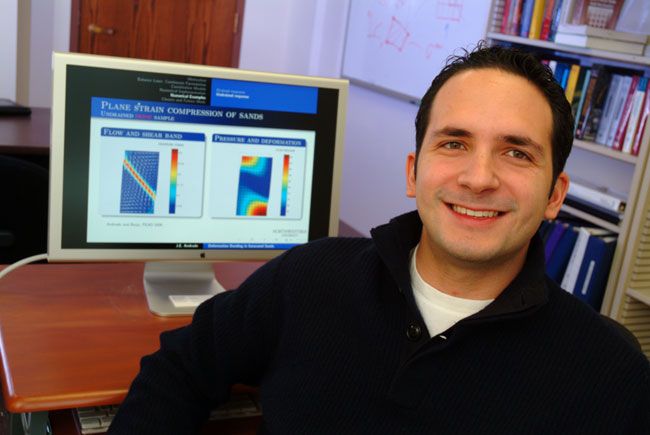'Cool Toys' Help Scientist Make Geological Predictions

Editor's Note: ScienceLives is an occasional series that puts scientists under the microscope to find out what makes them tick. The series is a cooperation between the National Science Foundation and LiveScience.
Name: José E. Andrade Age: 29 Institution: Northwestern University Field of Study: Mechanics
When an earthquake strikes, the ground shifts, and oftentimes, buildings crumble. But what if the buildings don’t crumble, but sink? In 1964, an earthquake in Niigata, Japan, caused apartment buildings along the Shinano river bank to tilt and sink into the ground — even though the buildings had little structural damage. This, scientists and engineers would later find out, was the result of liquefaction: the process under which soil, when excited, starts to behave like a liquid. But how can we know when exactly this will happen? Enter José Andrade, assistant professor of civil and environmental engineering at the McCormick School of Engineering and Applied Science. Andrade studies geomechanics, a subject that combines elements of civil, environmental, and mechanical engineering. He attempts to predict the behavior of geological materials with the hopes of being able to avoid the building catastrophes that often happen in the aftermath of natural disasters. Andrade and his research team create mathematical and computational models that could potentially predict when liquefaction — and its relative, the landslide — will occur. Learn more about his research at http://geomechanics.civil.northwestern.edu/Geomechanics_group.html. Andrade answers the ScienceLives 10 Questions below.
What inspired you to choose this field of study? My father is a civil engineer. I think this inspired me to pursue engineering in college. Later in graduate school, I discovered that my true passion was mechanics and its application to societal problems.
What is the best piece of advice you ever received? Dream big, work hard. Ambitious dreams allow us to aim high, much higher than we believe it is possible. Hard work translates dreams into reality.
What was your first scientific experiment as a child? As a child I experimented a lot, but I don't know if I could call my experiments "scientific." I was very much into understanding how things worked: taking apart clocks, TVs, and even electric outlets. Needless to say, my efforts for understanding the mechanics of the world were not much appreciated by my family.
What is your favorite thing about being a scientist or researcher? My favorite thing about being a scientist in engineering is the possibility to work every day on things that are fun, but that also really matter. I get paid to play with the coolest toys and to work on real and exciting projects. There is no better job. Besides, as a university professor, you get to spend time with young bright minds and that keeps your mind stimulated.
Sign up for the Live Science daily newsletter now
Get the world’s most fascinating discoveries delivered straight to your inbox.
What is the most important characteristic a scientist must demonstrate in order to be an effective scientist? I believe that the ability to communicate a complex idea clearly is what truly separates excellent scientists from the rest. The simplicity and clearness of the communication is proportional to the level of understanding. Talent is a necessary condition, but is not sufficient. The best scientists help others understand what they are doing.
What are the societal benefits of your research? The impact of my research is direct. My group studies the mechanics and physics of geological disasters, such as landslides and earthquakes. If we can understand what triggers these tragic events, we can try to develop models that can forecast the occurrence of these seemingly unpredictable disasters. By understanding how and why geological disasters happen, we can learn to design buildings and systems that are safer for everyone.
Who has had the most influence on your thinking as a researcher? A collection of people: my parents, my teachers, and my colleagues. My wife keeps me honest and focused. I have been fortunate to have a number of great mentors in life. What about your field or being a scientist do you think would surprise people the most? Science and research is the real world, when applied to the advancement of society. There is nothing unreal about what we do. And no, we don’t get the summers off!
If you could only rescue one thing from your burning office or lab, what would it be? My espresso machine. I can always reproduce my work.
What music do you play most often in your lab or car? That depends on my mood. If I am writing a paper, classical music is my favorite. If I am driving or writing a computer code, I really like Guns N' Roses.












